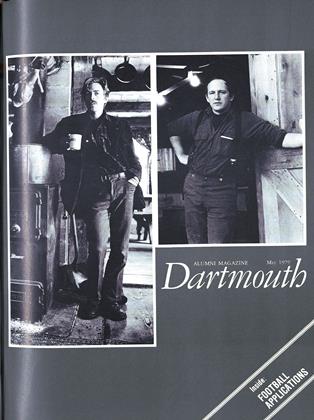John Kemeny says his "life has changed completely" since being chosen to head the investigation of the accident at the Three Mile Island nuclear power plant. At a local news conference shortly after his first meeting with the President of the United States, the President of Dartmouth College described how the appointment had taken him by surprise.
When he heard about President Carter's decision to have a commission investigate the accident, he "thought it was a good idea," but put the whole matter of the commission out of his mind until he received a call from the White House late Monday evening, April 9, informing him he was one of a small number of individuals being considered as chairman. When asked what his reaction would be if selected, Kemeny said, he "started thinking immediately of all the reasons to say no" and asked to think about it overnight. After conferring with David McLaughlin '54, chairman of the Board of Trustees, Kemeny talked with White House aides again and agreed to accept if he were chosen. (McLaughlin said at the time, "It doesn't really matter what discussion we have. ... If the President of the United States says he has selected you for this very important position, you're going to say yes.")
At 9:30 a.m. on the following Wednesday, another call from the White House asked him to meet with President Carter in Washington at 4:00 that afternoon. Kemeny's first response, according to his wife Jean, was to ask if it were "physically possible" to get from Hanover to Washington on such short notice. He made it, with 15 minutes to spare, and wrote his acceptance speech on the run.
The people who run the College and the people who write editorials all seem to think highly of Kemeny's appointment, although there has been some speculation in Hanover about whether he was motivated by more than a sense of duty in accepting. Kemeny has said repeatedly that he hoped the job would be given to someone else. In his acceptance speech he said, "I hope to spend the rest of my life at Dartmouth College. There is no personal ambition of mine served by accepting this assignment. I represent no special interest; my total commitment as chairman of this commission will be the discovery of truth and the formulation of recommendations in the national interest."
A profile of Kemeny in the New York Times described him as "a stocky, unathletic man who is friendly but is not at his best in small talk," and noted that he "brings to the commission a finely honed mind that has made him adept at asking the right questions and knowing where to find the answers. Moreover, he is a cool thinker who operates well under stress, the only sign of his inner tension being the ever-present cigarette he puffs."
Kemeny speculated that one of the reasons for his selection may have been his reputation for having an ability to explain complex technical matters in simple terms. Comparing his new duties to his responsibilities at Dartmouth, he said that "chairing the commission will be a more intense challenge, but it is not clear to me that chairing this commission will be more difficult than the presidency of a college," which he described as one of the most difficult jobs in the country.
Stating that he was pleased with the six- month deadline on the commission's work - a period long enough to do the job but short enough so that there is an end in sight - Kemeny pointed out that his appointment comes at a particularly inopportune time for himself and for Dartmouth. He said that "this is the busiest period of my entire life" and that the month of May, when the work of the commission will be getting under way, usually is busiest for the College. In addition, the Campaign for Dartmouth and recent campus controversies over fraternities, race relations, admission of women, and the Indian symbol have required his attention.
Kemeny has begun to cut back on his Dartmouth activities and has delegated a number of his responsibilities to Trustees and College officers in order to fulfill his obligation to the commission, which he estimates will require up to half his time. In Kemeny's absence, Leonard Rieser '44, vice president and dean of the faculty, will have authority for academic affairs, and William Davis, the treasurer, will act on non-academic matters. Kemeny said he scuttled plans for the first long vacation he and his wife would have had had in years and asked the College community "to please bear with me while I work my way through this. ... I suspect I will be splitting my life between Washington and Hanover, but if I can make it past Commencement, I think I will be all right."
The 200th anniversary of the death ofEleazar Wheelock was on April 24, an occasion that passed without ceremony in theCollege cemetery. In one of his last letters,he requested a pension "with which I mightbuy a cask of wine & other suitable spirits."
 View Full Issue
View Full Issue
More From This Issue
-
 Feature
FeatureThe Wooden Shoe: A Commune
May 1979 By Shelby Grantham -
 Feature
FeatureWhen They Resisted
May 1979 By Steven E. Tozer -
 Feature
FeatureA Three-story House on Bramhall Avenue
May 1979 By Douglas Andrews -
 Article
ArticleHearts and Minds Study
May 1979 By TIM TAYLOR -
 Class Notes
Class Notes1920
May 1979 By WILLIAM A. CARTER -
 Article
ArticleJudicial Clerk
May 1979 By M.B.R.









